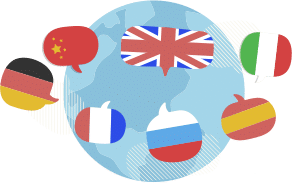Being a polyglot is not just a skill reserved for those with an innate talent. Some people find it easier than others to speak, retain, imitate an accent, but with regular practice of the language, everyone can improve their level!
So, let's take a look at 5 essential tips for learning a language naturally and quickly.
Regular use of the language to improve your level
1 . Don't follow traditional methods.
At school, you learn English or Spanish the same way you learn history, with vocabulary lists and grammar exercises. The result: after four years, you still can't speak the language! But don't worry, it's perfectly normal to understand a language without speaking it.
So turn to atypical methods. Indeed, practising speaking a language as much as possible is the best way to master it, because a language is not learned, it is spoken.
2. Pareto's law to boost your effectiveness

Pareto's law expresses the idea that 20% of our efforts constitute 80% of our results. In concrete terms, for English for example, we know that only 300 words make up 65% of all written English material. Not to mention the words that we already know, the ones that the brain retains easily, because they are similar to the ones we already know. So you don't really need to master all the words in a language to speak it!
From these 300 words you can even select all the "cognates" and learn them first. Cognates are all those words that are identical, whether in the original language or the language you are learning. There are lots of them, especially in French-English, so you have a lot of work done already!
3. Understanding the essence of the language
Each language has its own structure. Understanding this would allow us to move more quickly to guess the words.
In English, for example, it can be seen that words ending with -tion are often spelt the same way in English. Conception, precipitation, action, lotion...
Ce -tion changes to -ción for Spanish, -zione for Italian and -ção for Portugese.

Similarly, for the roots, learning a small list of Greek and Latin etymology would allow you to guess words, correct a word and know that it would be the real version...
The same goes for languages further afield! You'll be amazed at how much more there is in common than you think. See for yourself and listen to the song "Nations of the World" by Animaniac, entirely sung in Japanese, is nevertheless understandable by someone who does not know the language at all.
Thus, a final step in understanding the essence of a language would be to understand the accent, understand its phonetics and pronunciation.
4. Immerse yourself in the language
For this tip, forget your preconceived ideas, because being immersed in a language does not mean living abroad.
Indeed, have you ever noticed that many people will testify to living in a country without speaking a word of its language? You can learn Arabic very well in Hong Kong!

The most important part of this process is immersion mixed with emotion, is a personal feeling. For example, watching a series in English every day for a week can be as effective or more effective than spending a week in London. So feel free to read, watch and listen to the language you want to learn.
So of course, if you have the opportunity to go abroad, do so but don't forget to immerse yourself!
5. Speak, speak, speak!

You have to speak to practice a language. Ironically, speaking is ultimately the only way to use the language. Even though it can be scary, it is usually the brain that creates all these blocks for itself. Otherwise, how do you explain the fact that a person can go from an almost non-existent level in a language they studied for 10 years to a good level in the space of a week?
As explained in a previous article, school, through its language teaching, makes us work on the Wernicke's area, linked to the understanding of a language, but very little of Broca's area, the area of the brain that allows us to speak a language. So we have to force ourselves to speak because Wernicke's area prevents us from doing so.
Being multilingual is a dream for some and a goal for others. You now understand how your brain works, you know how a language works, so... Learning a language has no secrets for you, so... No excuses!












